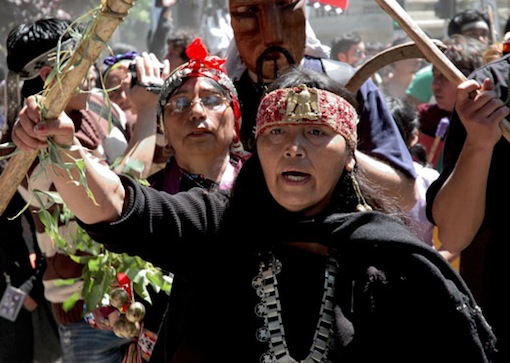Another Kind of Revolution
by JOHN SEVERINO

In the aftermath of the inspiring popular uprising in Argentina at
the end of 2001 and the battles that blocked neoliberalism in Bolivia
from 2003-2005, the Left came to power in governments across South
America—most notably in Argentina, Venezuela, Brazil, and Bolivia—in a
series of electoral upsets that were quickly hailed as revolutions. In
hindsight, these victories prove to be less than convincing. The new
revolutionary governments institutionalized social movements, turning
them into mere appendages, they continued cutting down the rainforests
and displacing indigenous peoples in the name of progress, they
supported free trade agreements, used paramilitary or police forces
against student demonstrators, expanded the exploitation of gas, oil,
and coal, and imprisoned dissidents. Business as usual.
The cynicism of these new governments should not have come as a
surprise. True revolutions do not happen overnight, and they are not
delivered by politicians. The kind of transformation that ends
exploitation, misery, and the destruction of the environment, and that
allows people to organize their own lives and fulfill their needs in
freedom and dignity comes about in an altogether different kind of way.
 Mining
conflicts are increasingly surfacing globally due to complains over
mines and pollution of water, soil and land occupied as well as over
transport and waste disposal. The Skouries forest in Halkidiki has been
at the center of a hot dispute between the mining company, Hellas Gold, a
subsidiary of the Canadian mining giant Eldorado Gold and local
communities. The company claims that an ambitious plan for mining of
gold and copper in the area- including deforestation and open pit mining
with excavation and everyday use of explosives- will benefit the region
through the creation of some 5,000 direct and indirect jobs, while
local residents argue that the planned investment will cause
considerable damage to the environment and livelihoods, resulting to
many more jobs losses in the existing sectors of the local economy
(farming, pasture land, fisheries, beekeeping, food processing and
tourism). The residents’ claims are supported by research conducted by
various independent scientific institutions including the Aristotle
University of Thessaloniki and the Technical Chamber of Macedonia. In
addition to legitimacy questions underpinning the transfer of mining
rights from the Greek state to the aforementioned company [1],
the Environmental Impact Assessment produced by El Dorado has been
found to contain gross methodological discrepancies and whilst the
public consultation process could be at best described as cosmetic [2].
Mining
conflicts are increasingly surfacing globally due to complains over
mines and pollution of water, soil and land occupied as well as over
transport and waste disposal. The Skouries forest in Halkidiki has been
at the center of a hot dispute between the mining company, Hellas Gold, a
subsidiary of the Canadian mining giant Eldorado Gold and local
communities. The company claims that an ambitious plan for mining of
gold and copper in the area- including deforestation and open pit mining
with excavation and everyday use of explosives- will benefit the region
through the creation of some 5,000 direct and indirect jobs, while
local residents argue that the planned investment will cause
considerable damage to the environment and livelihoods, resulting to
many more jobs losses in the existing sectors of the local economy
(farming, pasture land, fisheries, beekeeping, food processing and
tourism). The residents’ claims are supported by research conducted by
various independent scientific institutions including the Aristotle
University of Thessaloniki and the Technical Chamber of Macedonia. In
addition to legitimacy questions underpinning the transfer of mining
rights from the Greek state to the aforementioned company [1],
the Environmental Impact Assessment produced by El Dorado has been
found to contain gross methodological discrepancies and whilst the
public consultation process could be at best described as cosmetic [2].

